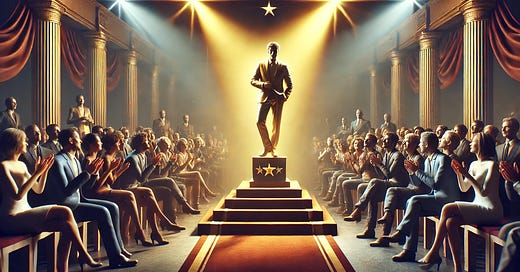Are Famous People Smarter? Exploring the Power and Fame Hypothesis
Understanding the Psychology Behind Leadership, Celebrity, and Social Dynamics
Famous People More Intelligent?
The Power and Fame Hypothesis is a concept in social psychology and organizational behavior that examines how perceptions of power and fame influence behavior, decisions, and social interactions. While not a formal framework, it offers a lens to explore power dynamics and fame as a social construct in various contexts.
Here’s a closer look at its key implications:
Power: The ability to control resources, shape outcomes, and influence others. People who perceive themselves as powerful often exhibit behaviors that reinforce or exploit their dominance.
Fame: Public recognition elevates social status and creates unique dynamics, even without formal authority.
Both power and fame shape how individuals behave and how others respond to them, often profoundly.
Behavioral Effects of Power
This hypothesis has real-world impacts.
Confidence and Assertiveness: Power leads to greater confidence and direct, goal-oriented behaviors.
Overconfidence and Unethical Behavior: Power can also encourage risky decision-making or unethical actions, as individuals feel shielded by their elevated status.
Behavioral Effects of Fame
Preferential Treatment: Famous individuals often receive special treatment but face heightened scrutiny.
Amplified Self-Awareness: Depending on how it is managed, fame can foster responsibility or, conversely, lead to self-serving behavior.
Psychological and Social Mechanisms
Several psychological theories help explain the dynamics of power and fame:
Approach/Inhibition Theory of Power: Power activates the “approach” system, encouraging action and goal-pursuit, while fame can inhibit behavior due to fear of reputational damage.
Social Comparison: Power and fame often invite comparisons, influencing self-esteem, ambition, and perceptions of fairness or envy.
Halo Effect: Fame creates a “halo” of perceived competence, leading people to overvalue the actions and opinions of the famous, regardless of actual expertise.
Moral Licensing: Power and fame can lead to moral licensing, where individuals feel entitled to act unethically because of their status.
Applications in Real Life
The Power and Fame Hypothesis manifests across various domains:
1. Leadership and Organizations:
Leaders with power or fame are often seen as role models, shaping organizational culture. However, unchecked status can lead to abuses of authority or disconnection from team members.
2. Media and Celebrity Culture:
Fame impacts public trust and credibility, influencing societal norms and values.
3. Social Movements:
Power and fame dynamics drive how movements gain momentum, attract supporters, and sustain influence.
4. Interpersonal Relationships:
Power and fame affect trust, collaboration, and vulnerability in personal and professional interactions.
Examples of Power and Fame in Action
1. Steve Jobs (Power in Leadership)
As co-founder and CEO of Apple, Steve Jobs wielded immense power to shape the company’s vision. His charisma inspired innovation, but his controlling leadership style created interpersonal challenges. Jobs’ success illustrated how power can drive focused achievement while stifling collaboration.
2. Elon Musk (Power and Fame Combined)
Elon Musk’s fame as an innovator amplifies his influence, allowing him to shape public opinion and even markets. His bold behavior, such as making controversial social media statements, highlights how fame can embolden individuals to act unconventionally.
3. Princess Diana (Fame and its Pressures)
Princess Diana’s global fame enabled her to champion humanitarian causes like HIV/AIDS awareness and landmine eradication. However, the intense scrutiny she faced highlights the double-edged sword of fame: it empowers individuals to enact change but can also expose them to significant personal challenges.
4. Harvey Weinstein (Abuse of Power)
Harvey Weinstein’s power as a Hollywood producer allowed him to exploit others for decades. His exposure catalyzed the #MeToo movement, illustrating how unchecked authority can lead to systemic abuse and how societal responses can challenge power structures.
Power, Fame, and the Stories We Tell Ourselves
Do famous people believe they’re more intelligent? Often, power and fame create a narrative of superiority that justifies their elevated status. But this might be a story they’re telling themselves.
The Power and Fame Hypothesis reminds us that elevated status shapes behavior—for better or worse. By examining these dynamics, we can better understand leadership, inequality, and the broader societal impacts of power and fame.
Which examples of power and fame resonate with you? Share your thoughts below!




